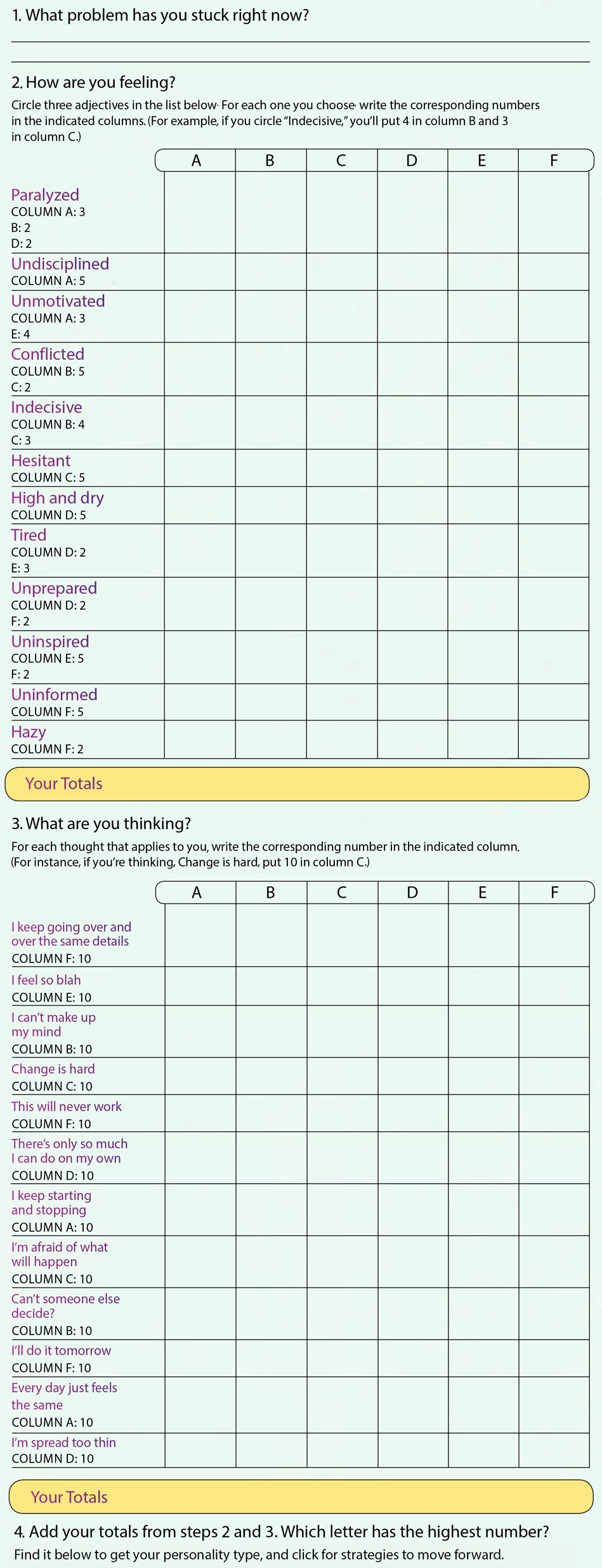When in a quandary, the best advice often comes from inside rather than outside.
Since we probably know ourselves better than anyone else does, then we may very well be the best person to ask for advice when we are in a quandary.
One interesting exercise is to try asking for advice from your past and future selves.
There is the younger self that you used to be and the older, more mature self that you will become.
You can gain a different perspective when you view present situations through your younger self's eyes or your mature self's more experienced point of view.
Perhaps, your younger self would view a current dilemma in a more innocent, less cynical way. Likewise, your older, hopefully, wiser, self may offer advice from a more compassionate, experienced
perspective.
Think back to how you viewed the world when you were younger.
What were your thoughts on happiness, love, and injustice?
Think about how you would have reacted to a dilemma you are currently facing.
The perspective may shed a different light on relationships, money matters, or life decisions.
Likewise, think about the person you will become.
A more mature version of you might mull a problem or conflict over carefully before taking action right away... or perhaps not.
Maybe your older self would be more willing to take risks, care less about what other people think, and want to enjoy life more.
You can even set up an advisory panel of your past, present, and future selves.
You might even want to try to have a written dialogue with yourselves to record the thoughts, feelings, and advice that your younger and older selves might have for your present self regarding a
current situation.
Your different selves can give you some invaluable answers. After all, no one can know you better than yourselves.
You are your wisest guide.

 |
|
Feeling Depleted
bby Madisyn Taylor
|
Often we go through life rundown, but the body's natural state is one of energy, clarity, and balance
There are times in our lives when it seems our bodies are running on empty.
We are not sick, nor are we necessarily pushing ourselves to the limit -- rather, the energy we typically enjoy has mysteriously dissipated, leaving only fatigue.
Many people grow accustomed to feeling this way because they do not know that it is possible to exist in any other state.
The body's natural state, however, is one of energy, clarity, and balance.
Cultivating these virtues in our own bodies so that we can combat feelings of depletion is a matter of developing a refined awareness of the self and then making changes based on our
observations.
A few scant moments of focused self-examination in which you assess your recent schedule, diet, and general health may help you zero in on the factors causing your depletion.
If you are struggling to cope with an overfull agenda, prioritization can provide you with more time to sleep and otherwise refresh yourself.
Switching to a diet containing plenty of nutritious foods may serve to restore your vigor, especially when augmented by supplements like B vitamins or ginseng. Consider, too, that a visit to a
healer or homeopath will likely provide you with wonderful insights into your tiredness.
But identifying the source of your exhaustion will occasionally be more complicated than spotting a void in your lifestyle and filling it with some form of literal nourishment.
Since your earthly and ethereal forms are so intimately entwined, matters of the mind and heart can take their toll on your physical self.
Intense emotions such as anger, sadness, jealousy, and regret need fuel to manifest in your consciousness, and this fuel is more often than not corporeal energy.
Conversely, a lack of mental and emotional stimulation may leave you feeling listless and lethargic.
Coping with and healing physical depletion will be easier when you accept that the underlying cause might be more complex than you at first imagined.
A harried lifestyle or a diet low in vital nutrients can represent only one part of a larger issue affecting your mood, stamina, and energy levels.
When you believe that you are ultimately in control of how you feel, you will be empowered to transform yourself and your day-to-day life so that lasting fatigue can no longer gain a foothold in
your existence.
|
---------------------------------------------------------------------------------------------------------------------------
4 Powerful Lessons You Gradually Learn as You Let Go of the Past
Written by Marc Chernoff

If somebody is working on themselves and changing for the better, it’s unnecessary to keep bringing up their past.
People can change and grow.
You know this is true.
But, have you given yourself a fair chance recently to change and grow, too?
Have you consciously loosened your grip on everything that’s behind you, so you can step forward again with grace?
If you’re shaking your head, you aren’t alone.
I know exactly how you feel.
I’ve been there myself, and I know dozens of others in the same boat.
At times, we all fall victim to our attachments.
And sometimes we don’t even realize we’re blocking our own present blessings by holding on to the past. Do your best to realize this right now…
Growth is painful.
Change is painful.
But in the end, nothing is as painful as staying stuck somewhere in the past.
Let me share a quick true story with you…
When Our Old Stories Hold Us Back
She rarely makes eye contact.
Instead, she looks down at the ground.
Because the ground is safer.
Because, unlike people, it expects nothing in return.
She doesn’t have to feel ashamed about her past.
The ground just accepts her for who she is right now.
As she sits at the bar next to me, she stares down at her vodka tonic, and then the ground, and then her vodka tonic.
“Most people don’t get me,” she says
. “They ask me questions like,
‘What’s your problem?’ or
‘Were you beaten as a child?’
But I never respond
Because I don’t feel like explaining myself. And I don’t think they really care anyway.”
Just then, a young man sits down at the bar on the opposite side of her.
He’s a little drunk, and says, “You’re pretty.
May I buy you a drink?”
She stays silent and looks back down at the ground.
After an awkward moment, he accepts the rejection, gets up, and walks away.
“Would you prefer that I leave too?” I ask.
“No,” she says without glancing upward. “
But I could use some fresh air.
You don’t have to come, but you can if you want to.”
I follow her outside and we sit on a street curb in front of the bar.
“Brrr… it’s a really chilly night!”
“Tell me about it,” she says while maintaining her usual downward gaze.
The warm vapor from her breath cuts through the cold air and bounces off of the ground in front of her.
“So why are you out here with me?
I mean, wouldn’t you rather be inside in the warmth, talking to normal people about normal things?”
“I’m out here because I want to be.
Because I’m not normal.
And look, I can see my breath, and we’re in San Diego.
That’s not normal either.
Oh, and you’re wearing old Airwalk sneakers, and so am I—which may have been normal in 1994, but not anymore.”
She glances up at me and smirks, this time exhaling her breath upward into the moonlight.
“I see you’re wearing a ring.
You’re married, right?”
“Yeah,” I reply.
“My wife, Angel, is just getting off work now and heading here to meet me for dinner.”
She nods her head and then looks back at the ground.
“Well, you’re off the market… and safe, I guess. So can I tell you a story?”
“I’m listening.”
As she speaks, her emotional gaze shifts from the ground, to my eyes, to the moonlit sky, to the ground, and back to my eyes again.
This rotation continues in a loop for the duration of her story.
And every time her eyes meet mine she holds them there for a few seconds longer than she did on the previous rotation.
I don’t interject once.
I listen to every word.
And I assimilate the raw emotion present in the tone of her voice and in the depth of her eyes.
When she finishes, she says, “Well, now you know my story. You think I’m a freak, don’t you?”
“Place your right hand on your chest,” I tell her.
She does
. “Do you feel something?” I ask.
“Yeah, I feel my heartbeat.”
“Now close your eyes, place both your hands on your face, and move them around slowly.”
She does. “What do you feel now?”
I ask.
“Well, I feel my eyes, my nose, my mouth…
I feel my face.”
“That’s right,” I reply.
“But unlike you, stories don’t have heartbeats, and they don’t have faces.
Because stories are not alive—they’re not people.
They’re just stories.”
She stares into my eyes for a prolonged moment, smiles sincerely, and says, “Just stories we live through.”
“Yeah… And stories we learn from.”
Lessons We Learn as We Let Go
The woman from the story above became one of our very first students when Angel and I opened the doors to the original version of the Getting Back to Happy Course nearly a decade ago, and she’s now a good friend of ours too.
She has learned and applied many remarkable lessons over the years that ultimately allowed her to let go of her heartbreaking past—her heartbreaking story—and move forward with her life.
And last night, I sat down with her over a glass of wine and had an in-depth, soul-centered conversation about what she has learned over the years.
I’m sharing her story and lessons with you today, with full permission, because I know we all struggle in similar ways.
Here are four key, actionable lessons we discussed…
1. You can have a heartbreaking story from the past, without letting it rule your present.
In the present moment, we all have some kind of pain: anger, sadness, frustration, disappointment, regret, etc.
Notice this pain within yourself, watch it closely, and see that it’s caused by whatever story you have in your head about what happened in the past (either in the recent past or in the distant
past).
Your mind might insist that the pain you feel is caused by what happened (not by the story in your head about it), but what happened in the past is NOT happening right now.
It’s over.
It has passed.
But the pain is still happening right now because of the story you’ve been
subconsciously telling yourself about that past incident.
Note that “story” does not mean “fake story.”
It also does not mean “true story.”
The word “story” in the context of your self-evaluation doesn’t have to imply true or false, positive or negative, or any other kind of forceful judgment call.
It’s simply a process that’s happening inside your head:
- You are remembering something that happened.
- You subconsciously perceive yourself as a victim of this incident.
- Your memory of what happened causes a strong emotion in you.
So just notice what story you have, without judging it, and without judging yourself.
It’s natural to have a story; we all have stories.
See yours for what it is.
And see that it’s causing you pain.
Then take a deep breath and another…
Inner peace begins the moment you take these deep breaths and choose not to allow the past to rule your present thoughts and emotions.
2. A big part of letting go is simply realizing there’s nothing to hold on to in the first place.
All of the things from our past that we desperately try to hold on to, as if they’re real, solid, everlasting fixtures in our lives, aren’t really there.
Or if they are there in some form, they’re changing, fluid, impermanent, or simply imagined storylines in our minds.
Life gets a lot easier to deal with the moment we understand this.
Imagine you’re blindfolded and treading water in the center of a large swimming pool, and you’re struggling desperately to grab the edge of the pool that you think is nearby, but really it’s
not—it’s far away.
Trying to grab that imaginary edge is stressing you out, and tiring you out, as you splash around aimlessly trying to hold on to something that isn’t there.
Now imagine you pause, take a deep breath, and realize that there’s nothing nearby to hold on to. Just water around you.
You can continue to struggle with grabbing at something that doesn’t exist… or you can accept that there’s only water around you, and relax, and float.
Today, I challenge you to ask yourself:
- What’s something from the past that you are still desperately trying to hold on to?
- How is it affecting you in the present?
Then imagine the thing you’re trying to hold on to doesn’t really exist. Envision yourself letting go… and just floating.
How might that change your life from this moment forward?
3. The subtle pain you continue to feel can be healed through compassion for those suffering alongside you.
When we’re still working through a painful experience from the past, it’s easy to feel like we’re going through it alone—as no one else could possibly understand how we feel.
In a way, we subconsciously place ourselves at the center of the universe and see everything that happened exclusively from the viewpoint of how it affects us personally, without regard for anyone
else.
But as we grow through our pain and gradually broaden our horizons, we begin to
see that our self-centered thinking is only fueling our misery.
And we realize that shifting our focus onto others for a while can help.
It’s one of life’s great paradoxes: when we serve others, we end up benefiting as much if not more than those we serve.
So whenever you feel pain from the past trying to suck you back in, shift your focus from your circumstances to the circumstances of those near and far.
The simplest way of doing this at any given moment?
Practice letting your breath be an anchor for global healing…
Breathe in whatever painful feeling you’re feeling, and breathe out relief from that pain for everyone in the world who is suffering alongside you.
For example:
- If you’re feeling grief, breathe in all the grief of the world… then breathe out peace.
- If you’re feeling anger, breathe in all the anger of the world… then breathe out forgiveness.
- If you’re feeling regretful, breathe in all the regret of the world… then breathe out gratitude for the good times.
Do this for a minute or two as often as you need to, imagining all the pain of those near and far coming in with each breath, and then a feeling of compassion and reconciliation radiating out to
all of those who are in pain as you breathe out.
Instead of running from your past and the pain it caused you, you’re embracing it… you’re letting yourself absorb it.
And you’re thinking of others as well, which gets you out of that miserable, self-centered mindset trap.
4. There is always, always, always something to be thankful for in the present.
Even when your past—your story—tries to pull you back in, you can consciously do your best to focus on your present blessings.
What do you see in your life right now?
Be thankful for it all.
For your health, your family, your friends, and your home.
Many people don’t have these things.
Also, remind yourself that the richest human isn’t the one who has the most, but the one who needs less.
Wealth is a mindset.
Want less and appreciate more today.
Easier said than done of course, but with practice, it does get easier.
And as you practice, you transform your past struggles into present moments of freedom.
Ultimately, happiness is letting go of what you assume your life is supposed to be like right now and sincerely appreciating it for everything that it is.
At the end of this day, before you close your eyes, smile and be at peace with where you’ve been and grateful for what you have. Life is good.
Your turn…
Again, the lessons above take practice to fully grasp in real-time, because oftentimes we don’t even realize we’re blocking our own present blessings by holding on to the past. So just do your
best to bring awareness to this—to practice diligently—so you can gradually let go. Keep reminding yourself…
- You are not your bad days
- You are not your mistakes
- You are not your scars
- You are not your past
Be here now and breathe.
-----------------------------------------------------------------------------------------------------------------
-----------------------------------------------------------------------------------------------------------------
I recently got stuck.
My attention was scattered, my energy was low, and I didn’t do good work.
At those times, I think of something I learned from one of my friends and mentors:
So after I got stuck last time, I thought of the hard things about life I was ignoring.
Once I returned to these lessons, everything improved again.
Here’s the list I made for myself.
Remember, these lessons are uncomfortable, but deep down, we all know how important they are.

























